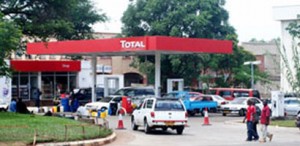Another fuel price hike looming
Published on June 15, 2012 at 12:31 PM by FACE OF MALAWI
Malawi braces for more hard times with fuel prices likely to jump again as government has decided to factor into fuel price build up vehicle licence fees which were previously paid through the Road Traffic Directorate (RTD).
The hike comes hot on the heels of another adjustment early last month which saw fuel prices going up by an average of 30 percent.
The minibus owners association of Malawi (Moam), while saying the move will save time transport service operators were spending queuing for licences at the RTD, has asked government to ensure that the increase in fuel pump price reflects the fee motorists were paying for the licences.
And the consumers association of Malawi (Cama) says the new system is confusing and that government needs to do a lot of explaining for consumers to understand how this will be operated.
Finance minister Ken Lipenga, who announced the measure in his budget statement to Parliament last Friday, confirmed in an interview on Monday that fuel prices will have to be adjusted to factor in the vehicle licence fee.
He, however, said people need not worry as government is only transferring the fee from Road Traffic Directorate to the pump and that he does not expect the prices to move up astronomically with the new levy.
“The licence fee wasn’t very large and was paid annually,” obser ved Lipeng a, adding: “Malawians need to understand that this move is aimed at improving efficiency. Previously, we were losing out as many motorist were not complying with this measure.”
He said by collecting the fees at the pump, every motorist will contribute towards improving the quality of roads.
In his budget statement, Lipenga said the move was necessary so that motorists should fairly contribute towards road maintenance.
“Mr. Speaker, Sir, in order to ensure that all vehicles using the public roads in Malawi are paying their fair contribution to road maintenance and construction, the motor vehicle licence fee will now be collected through the fuel pump price,” said Lipenga.
“This user-fee should not be viewed as an additional levy on fuel as it is only a change of the collection point,” said Lipenga.
Currently, Malawian motorists pay vehicle licence fees once or twice a year, depending on the use of the vehicle as well as its weight.
For example, salon vehicles weighing around 1.5 tonnes cost the motorist around K3, 000 per annum.
The change in the system means that vehicles will no longer need to have three discs, vehicle licence, insurance and certificate of fitness (COF) but will only have COF and insurance.
In other countries such as South Africa, government uses toll gates to collect fees to improve roads.
But Lipenga, while appreciating the efficiency of toll gates, said impl ement ing them i s a bi t complicated as there are a number of issues to be considered.
Moam Secretary General Coxley Kamange said Tuesday the increase in fuel prices should be reasonable and must reflect what motorists were contributing to government coffers through the RTD.
On a positive note, Kamange said the idea to collect the fees through the pump wi l l save motorists from the penalties they were increasing when the vehicles were not operational.
“The development will save us time which we were spending at the Road Traffic Directorate to process the vehicle license fees,” said Kamange.
The Malawi Energy Regulatory Authority (Mera) early last month hiked the pump price for petrol from K380 to K490/litre, representing a 29 percent increase while the price of diesel jumped from K360 to K475/litre, representing a 32 percent hike.
Mera kept the price of paraffin for domestic use at K171 per litre, but hiked the price of industrial paraffin to K388/litre.
The development also saw total levies on petrol coming down to K86.74 from K228.27 on petrol, K82.38 from K206.83 on diesel and K34.21 from K46 on paraffin, a move which Lipenga said was aimed at minimising the adjustment of the price which was necessitated by a Malawi kwacha devaluation.
The fuel price increase has seen prices of commodities, which went up due to the 48.8 percent devaluation of the kwacha, inching further upwards as businesses factored in costs of transport and importation of raw materials.
Cama Execcutive Director John Kapito said yesterday there will be a lot of challenges emanating from the system because not all fuel bought is used on motor vehicles.
“What about those who use the fuel for generators, maize mills and boats. Won’t they be made to pay for things that they are not concerned about? wondered Kapito.



